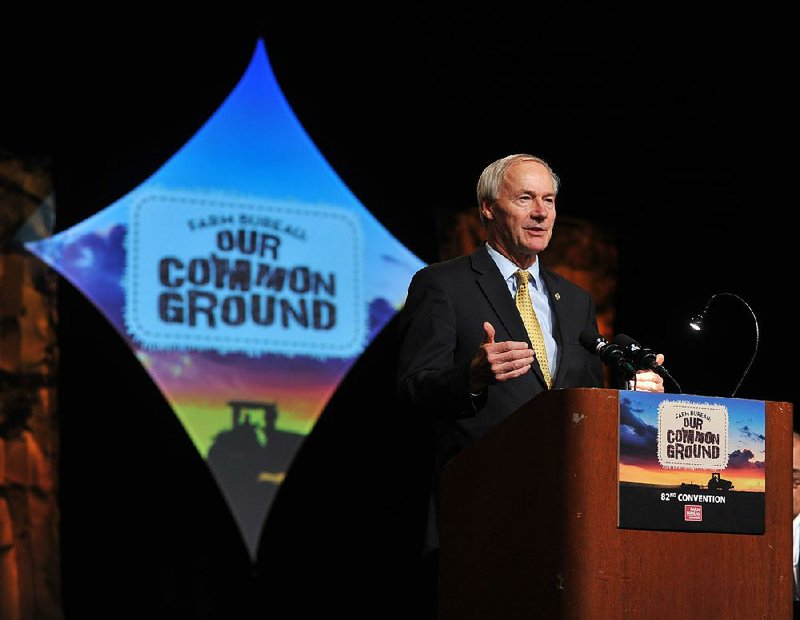HOT SPRINGS -- Gov. Asa Hutchinson told a few hundred Arkansas farmers Wednesday he had a "good conversation" Monday night with President-elect Donald Trump and helped make him aware of the importance to farmers of agricultural exports.
The death this week of former Cuban president Fidel Castro was "an interesting twist" to ongoing efforts to reopen trade with the communist island, Hutchinson said.
"It's like expectations went up," Hutchinson said, both for trade opportunities and to put "greater pressure on the Cuban regime" to allow more freedom to its people.
Hutchinson, who grew up on a 280-acre cattle farm in Benton County, called his telephone conversation a "good opportunity to educate a New Yorker" about the importance of agriculture to the nation.
Hutchinson's remarks came during his keynote address on the opening day of the 82nd convention of the Arkansas Farm Bureau. About 190,000 Arkansas families are members of the group. About 1,000 people are expected for the convention, which runs through Friday.
Hutchinson said he was able to work in the telephone conversation "between tweets" by the president-elect. "I say that only half jokingly," he said.
"There's a lot to learn" about Trump's trade policies, Hutchinson told reporters after his 10-minute address.
Arkansas is the nation's top rice grower. Cuba, meanwhile, imports about 80 percent of the food for its 11 million people, including 400 tons of rice each year, mostly from Vietnam.
Trump, during his campaign for the Republican nomination, said he was open to lifting the trade embargo against Cuba. During the general election, however, Trump railed against President Barack Obama's administration restoring diplomatic relations with Cuba in December 2014, including allowing U.S. flights to Havana and lifting bans against the import of Cuban cigars and rum.
After Castro's death, Trump wrote on Twitter: "If Cuba is unwilling to make a better deal for the Cuban people, the Cuban/American people and the U.S. as a whole, I will terminate deal."
Hutchinson led a delegation of farmers, agriculture lobbyists, and other elected officials on a trade mission to Cuba in September 2015. He was the first governor from the United States to officially visit that country since the U.S. placed a trade embargo there in 1960 after Castro took power. About 10 years ago, Congress also passed legislation requiring Cuba to pay cash for any imports from the U.S.
A few days after that trip, Hutchinson said, Cuba purchased 4,500 tons of Arkansas poultry.
Hutchinson also he said he touted to Trump the importance of other trade partners, noting recent investments in Arkansas by a Chinese garment manufacturer and a wood-pulp manufacturer.
Randy Veach, the president of the Arkansas Farm Bureau now seeking election to his ninth one-year term, echoed Hutchinson's comments in an interview.
Arkansas exports about 40 percent of its agricultural products. Cuba, in particular, could be a $2 billion market and a prime target for Arkansas rice and soybean growers and poultry producers, Veach said.
Castro's death "should improve" relations between the two countries. "I think the hard lines have softened" since Castro left the Cuban presidency about 10 years ago and put his brother, Raul Castro, in charge, Veach said. "I think the 117th Congress will look at it differently," he said, with Castro's death. "They've got to see that Cuban citizens themselves, not just the Cuban government, will benefit from increased trade."
Veach said rural America, especially the farming community, elected Trump but was uncertain whether the president-elect can really relate to them.
Trump's immigration policies are still uncertain, and Veach said that uncertainty extends to farmers and their future workforce. "We've had producers here in Arkansas -- with melons, peaches and berries -- who saw their work just rot away," Veach said.
Veach also said Congress must approve a 2018 farm bill that is fairer to livestock producers while also providing better aid to row-crop farmers when market prices are down.
Net farm income has declined across the nation three consecutive years. Veach said farmers, for the 2016 season, likely are looking at a fourth-straight year of declines. But land values have remained fairly steady, Veach noted. "Farmers are incurable optimists," he said.
Business on 12/01/2016
